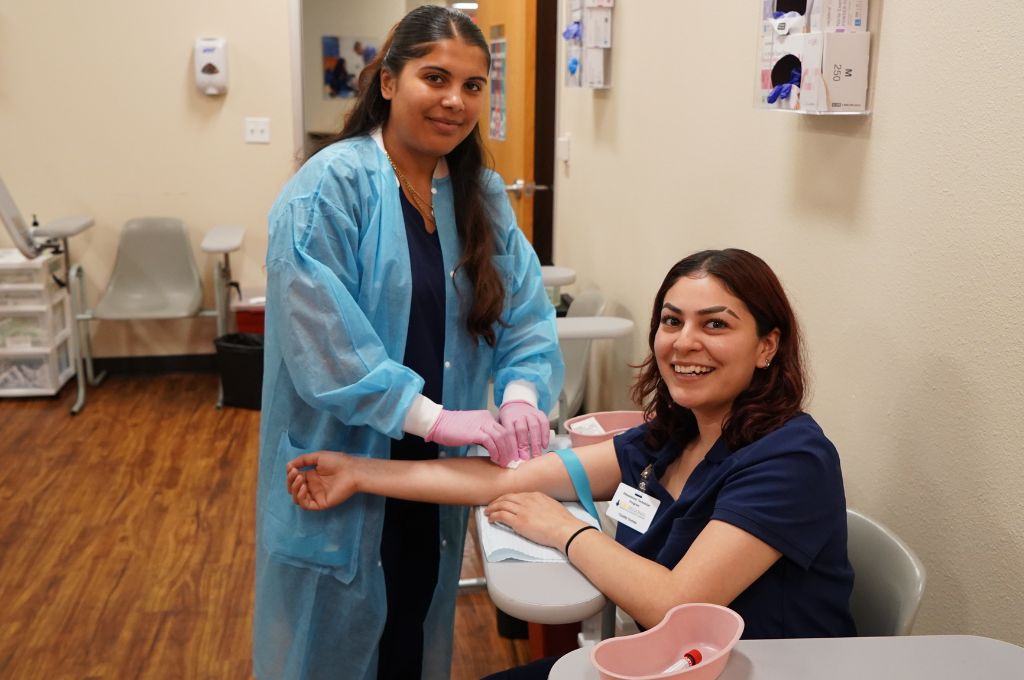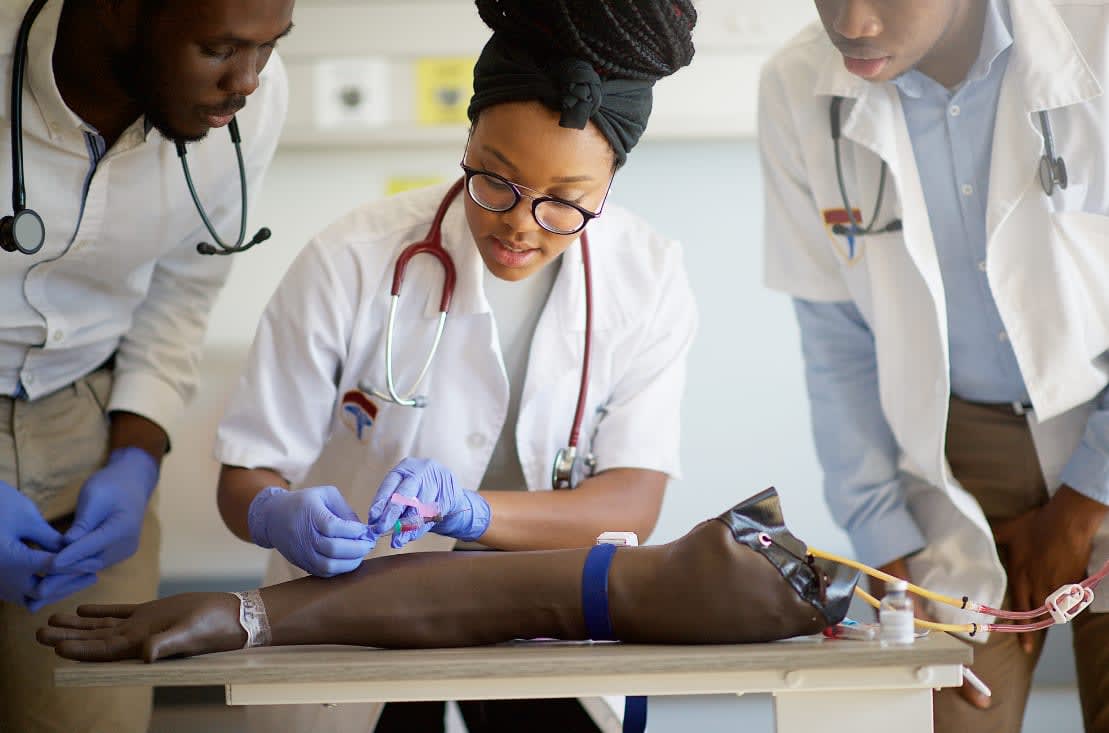The Path to Qualification: Understanding the Phlebotomy Educating Course Journey and Its Relevance
As you consider the course to qualification in phlebotomy, it's essential to recognize the duty you'll play in health care. Your training will certainly cover necessary skills, from blood collection strategies to patient communication. Each element of the program prepares you for the obstacles ahead. What exactly does the journey entail, and why is certification so vital for your future occupation? Allow's check out these questions better.

The Duty of Phlebotomists in Healthcare
Phlebotomists play an important role in the medical care system, serving as the vital web link in between people and vital diagnostic testing. You'll carry out blood attracts, making sure examples are gathered precisely and securely. Your experience assists in detecting medical problems, monitoring health and wellness, and assisting treatment decisions.
In your everyday interactions, you'll need to develop depend on with individuals, making them feel comfortable throughout what could be a demanding experience. You're responsible for identifying and managing samples meticulously to stop contamination or mistakes, which can impact examination outcomes.
Beyond this, you'll usually work along with doctors and nurses, connecting essential information concerning clients' problems. Your duty is basic in keeping the workflow in healthcare setups, ensuring timely and exact results. By grasping your skills, you add meaningfully to client care, making you an indispensable component of the clinical team. Welcoming this responsibility is vital to your success as a phlebotomist.
Summary of Phlebotomy Training Programs
When exploring phlebotomy training programs, you'll discover different types made to fit different routines and discovering styles. Each program assists you develop crucial skills like blood collection and person communication. Recognizing these choices is essential to choosing the ideal course for your occupation.
Kinds of Training Programs
Several kinds of training programs are offered for those wanting to become efficient in phlebotomy. You can pick from certificate programs, which typically last a couple of months and concentrate on necessary skills. There are also diploma programs that provide an even more extensive education, frequently lasting as much as a year. If you're trying to find a deeper understanding, an associate degree in a related field could be the appropriate fit. On-line courses supply flexibility for those balancing job or household commitments, enabling you to research at your own speed. Furthermore, some healthcare facilities and centers supply on-the-job training programs, giving sensible experience while you find out. Whatever path you pick, each program aims to furnish you with the needed skills for an effective phlebotomy career.

Trick Skills Created
Grasping phlebotomy calls for a collection of essential skills that are developed via detailed training programs. You'll find out technological abilities like correct vein option, needle insertion, and blood collection strategies. These hands-on practices assure you can do treatments safely and successfully. Additionally, communication skills are basic; you'll require to interact with patients, describe procedures, and placed them at convenience. Understanding anatomy and physiology is important, too, as it helps you locate capillaries and comprehend the body's response to blood draws. You'll obtain knowledge of safety methods and infection control, assuring you keep a clean and sterile atmosphere. Each of these skills is important for your success as a qualified phlebotomist, making you a beneficial possession in any medical care setup.
Key Components of a Phlebotomy Program
In a phlebotomy course, you'll concentrate on essential subjects that lay the foundation for your future job. You'll take part in hands-on training that enables you to use what you have actually found out in real-world setups. Both the core curriculum and sensible experience are important for your success as a phlebotomist.
Core Educational Program Overview
While pursuing a phlebotomy training program, you'll encounter a curriculum designed to outfit you with fundamental abilities and knowledge. Phlebotomy Classes Near Me. This curriculum generally includes composition and physiology, concentrating on the blood circulation system and understanding blood elements. You'll likewise find out about different kinds of blood collection approaches, consisting of venipuncture and capillary slit methods
Additionally, infection control and safety procedures are crucial parts, guaranteeing you understand how to preserve a clean and sterile atmosphere. You'll examine patient interaction, emphasizing communication and empathy, which are important for easing patient anxiety. Ultimately, moral and legal considerations will certainly be resolved, preparing you for real-world duties. This fundamental knowledge will certainly enable you to succeed as a phlebotomist and give quality care in professional setups.
Hands-On Training Experience
Obtaining hands-on experience is a crucial part of your phlebotomy training program. This sensible training enables you to apply what you have actually found out in a real-world setting, improving your skills and self-confidence. You'll practice venipuncture techniques, find out how to take care of different sorts of specimens, and get acquainted with the tools made use of in the area. Under the support of knowledgeable trainers, you'll refine your abilities, ensuring you're gotten ready for any type of scenario you might deal with.
In addition, you'll obtain the possibility to communicate with individuals, which is crucial for creating your interaction abilities. This combination of technological effectiveness and interpersonal skills is essential for your success as a qualified phlebotomist. Inevitably, hands-on training is where theory fulfills method, solidifying your understanding and readiness for accreditation.
Certification and Licensing Needs
Before you can begin your profession in phlebotomy, it is vital to understand the certification and licensing demands that vary by state. Most states require phlebotomists to hold an accreditation from an acknowledged company, such as the National Phlebotomy Association or the American Society for Professional Pathology. These qualifications commonly involve passing an examination that examines your understanding and abilities in the area.
In addition to qualification, some states have specific licensing requirements. You might require to finish a particular variety of hours in clinical technique, send evidence of training, or go through a history check. It is necessary to research your state's laws to ensure you satisfy all needed standards.
Remaining educated concerning these needs link not just aids you secure a position yet likewise improves your reputation as a specialist. By satisfying these needs, you'll be well on your means to a successful profession in phlebotomy.
Hands-On Training and Practical Experience
Hands-on training and functional experience are vital parts of your phlebotomy education, as they enable you to use academic knowledge in real-world scenarios. During your training, you'll take part in monitored venipuncture, discover proper methods, and come to be accustomed to numerous blood collection devices. This direct involvement is important for developing your confidence and honing your skills.
You'll function very closely with experienced experts that can direct you through the nuances of patient communication and example handling. Each practice session not just strengthens your understanding but also prepares you for the busy atmosphere of healthcare setups.
Additionally, lots of programs integrate scientific rotations, enabling you to experience diverse setups, from health centers to outpatient centers. This exposure assists you adjust to different obstacles and patient needs, guaranteeing you're well-prepared for your future role. Accept these opportunities, as they're necessary to ending up being an experienced and caring phlebotomist.
Obstacles Faced During Training
While gaining hands-on experience is necessary, it is necessary to recognize the challenges that can emerge during your phlebotomy training. You could come across anxiousness when performing procedures on actual individuals, particularly if you're new to the setting. The stress to get every little thing right can be overwhelming. Additionally, mastering the skills required for blood draws takes method; you may fight with technique initially.
Time management can likewise be an obstacle, as harmonizing concept, sensible sessions, and personal dedications can feel challenging. You may face differing learning speeds amongst your peers, leading to sensations of insecurity if you think you're falling back. Finally, adjusting to the various individualities of instructors can be challenging, as each might have an unique mentor design.
Recognizing these barriers at an early stage can prepare you for success and help you create strength throughout your Get the facts training journey.
Occupation Opportunities After Certification

As you acquire experience, you might also consider concentrating on locations like pediatric or geriatric phlebotomy, providing to certain individual demands. Some phlebotomists select to advance their occupations by ending up being laboratory service technicians or seeking further education in healthcare fields.
Furthermore, your accreditation can cause functions in training or managing brand-new phlebotomists, permitting you to share your understanding. With the healthcare market continually expanding, your skills will always remain in need, paving the way for a secure and fulfilling job. Welcome the opportunities waiting for you!
Often Asked Inquiries
What Is the Regular Period of a Phlebotomy Training Course?
Phlebotomy training programs usually last around four to 8 weeks. You'll participate in hands-on method, Learn More Here classroom instruction, and on the internet knowing. Completing this training prepares you for qualification and a fulfilling career in medical care.
Are Online Phlebotomy Courses Available?
Yes, on the internet phlebotomy courses are available. They offer adaptability and convenience, enabling you to examine at your very own speed. Simply confirm the program is certified to satisfy certification needs and get beneficial skills for your job.
Just How Much Does Phlebotomy Training Usually Cost?
Phlebotomy training generally sets you back between $700 and $2,500, relying on the program and place. You need to take into consideration elements like course length, consisted of materials, and hands-on experience when selecting the best training for you.
What Prevail Prerequisites for Phlebotomy Training?
Usual prerequisites for phlebotomy training usually consist of a senior high school diploma or GED, immunizations, and a background check. Some programs might also need basic medical care knowledge or certifications, ensuring you're prepared for hands-on training.
Can I Function While Completing My Phlebotomy Training?
Yes, you can function while finishing your phlebotomy training. Several pupils equilibrium tasks with their studies, however make certain to manage your time effectively to ensure you fulfill both job and training dedications effectively.